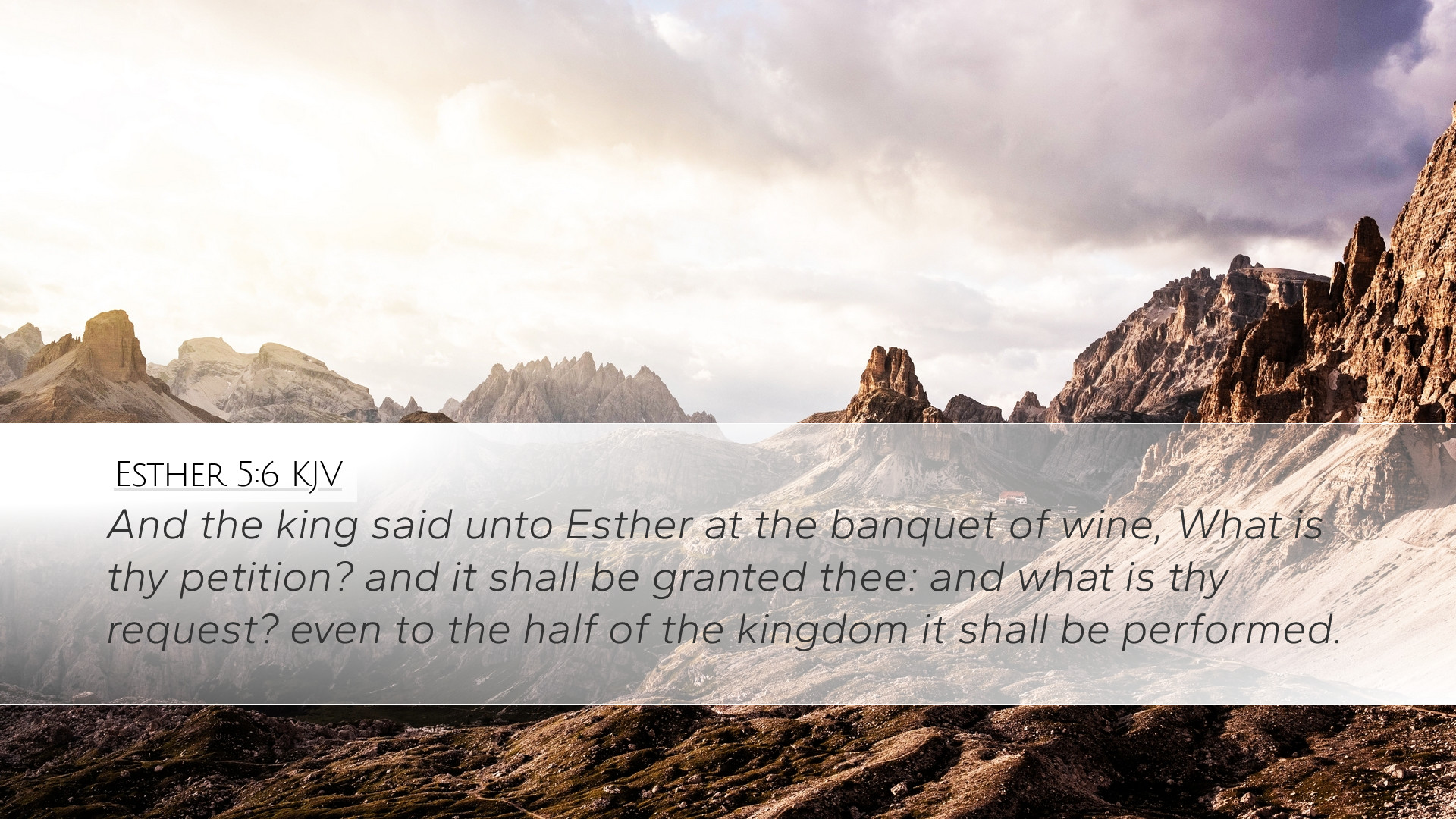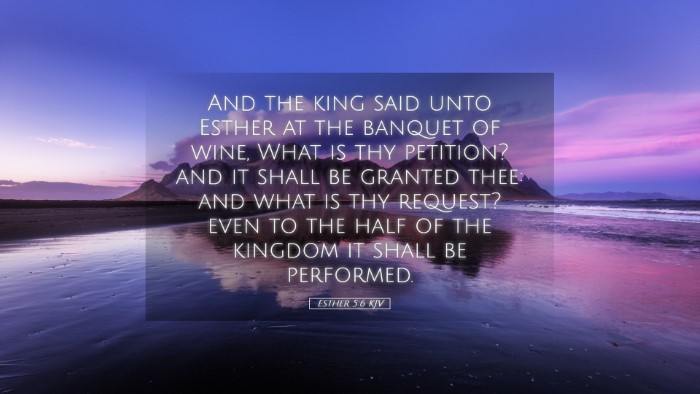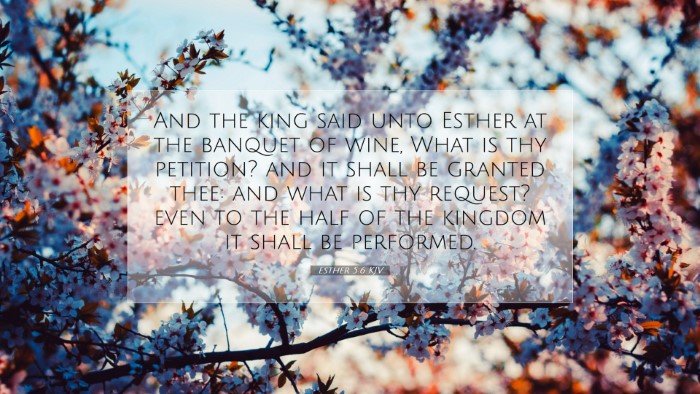Old Testament
Genesis Exodus Leviticus Numbers Deuteronomy Joshua Judges Ruth 1 Samuel 2 Samuel 1 Kings 2 Kings 1 Chronicles 2 Chronicles Ezra Nehemiah Esther Job Psalms Proverbs Ecclesiastes Song of Solomon Isaiah Jeremiah Lamentations Ezekiel Daniel Hosea Joel Amos Obadiah Jonah Micah Nahum Habakkuk Zephaniah Haggai Zechariah MalachiEsther 5:6
Esther 5:6 KJV
And the king said unto Esther at the banquet of wine, What is thy petition? and it shall be granted thee: and what is thy request? even to the half of the kingdom it shall be performed.
Esther 5:6 Bible Commentary
Commentary on Esther 5:6
Introduction
Esther 5:6 is a pivotal verse in the narrative of Esther, representing a significant moment in the divine orchestration of events that lead to the deliverance of the Jewish people from imminent peril. In this verse, Queen Esther invites King Ahasuerus and Haman to a banquet she has prepared. This moment is not merely about physical sustenance but is steeped in intricate social and theological implications. Below, we will explore insights from various public domain commentaries, highlighting the richness of this text for pastors, students, theologians, and Bible scholars.
Contextual Overview
Prior to this verse, Esther has been animated by courage and faith, having resolved to approach the king despite the risk to her life. The backdrop of this tension is crucial to understanding the significance of her actions. Many commentaries point out that Esther's request for the king and Haman to join her for a banquet speaks volumes about her strategic planning and reliance on God’s providence.
Matthew Henry's Commentary
Matthew Henry elucidates that Esther’s approach to the king at the banquet symbolizes her boldness and faith in the Lord. He remarks that although Esther had a heavy burden upon her, she chose a peaceful means to engage the king, contrasting the urgency of a direct confrontation with the subtleness of a banquet invitation.
- Faith and Strategy: Henry posits that Esther acted wisely, demonstrating both her understanding of royal protocol and her trust in God's plan. By inviting both the king and Haman, she hopes to gain their favor and possibly reveal the plot against her people.
- Pleasantness of the Banquet: The banquet symbolizes reconciliation and peace; Esther’s intention is to cultivate goodwill, emphasizing the importance of approachability in leadership.
Albert Barnes' Notes
Albert Barnes notes the significance of the invitation and the atmosphere of the banquet. He observes that this event serves as a critical junction in the story, as it allows Esther to subtly present her request and the plight of her people without provoking immediate hostility from Haman.
- Diplomacy and Timing: Barnes points out the masterful diplomacy involved in Esther's approach. She takes time to build a rapport with the king and Haman, showcasing her adeptness at navigating royal dynamics.
- Divine Timing: Barnes suggests that the timing of the banquet is divinely orchestrated. Esther’s courage to act at this moment reflects her reliance on God’s timing, an essential lesson for leaders today.
Adam Clarke's Commentary
Adam Clarke's insights reflect on the psychological aspects of Esther’s invitation. He emphasizes the emotional and psychological tension inherent in the gathering, given Haman’s plot and the king's unaware complicity.
- Esther's Inner Turmoil: Clarke highlights Esther's inner conflict—her willingness to risk her life for her people while still seeking to maintain her role as queen and wife. This complexity is essential for understanding her character.
- Symbolism of the Feast: The feast is not just a meal but a stage for Esther’s revelation. Clarke elaborates on how feasts in Biblical tradition often serve as settings for significant revelations, making Esther’s invitation not merely social but profound.
Theological Reflections
When we reflect on Esther 5:6 from a theological perspective, several themes emerge:
- God's Sovereignty: The orchestration of events surrounding Esther demonstrates God’s providential care over His people. Even in human schemes, His plans prevail.
- Human Agency and Divine Purpose: Esther’s role as a deliverer emphasizes the partnership between divine providence and human action. She models for believers the importance of acting with faith.
- Faith Over Fear: Esther embodies the principle that faith should govern our fears. Her courage inspires many to confront difficult situations with trust in God.
Application for Today
As pastors, students, and scholars examine Esther 5:6, the implications are clear:
- Wisdom in Leadership: Leaders ought to be strategic and wise in their approaches, considering the implications of their actions within their communities.
- Importance of Prayer and Preparation: Just as Esther prepared for the banquet, believers today must prepare spiritually and tactically for the challenges they face.
- Encouragement in Crisis: Esther’s narrative is a profound encouragement during crises, suggesting that quiet strength and strategic action can lead to significant outcomes.
Conclusion
In conclusion, Esther 5:6 serves as a rich verse ripe for exploration and reflection. Through the insights of Matthew Henry, Albert Barnes, and Adam Clarke, we uncover layers of meaning that offer guidance for navigating leadership, faith, and the challenges of standing for justice. The story of Esther encourages timeless lessons of courage, faith, and divine providence, calling all believers to act diligently and prayerfully in their lives.


